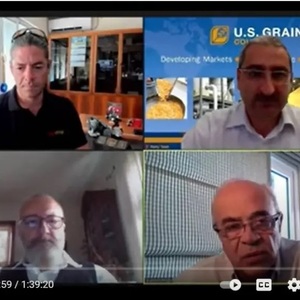USGC extends corn coproducts educational program in Turkey

SOURCE: U.S. Grains Council
July 27, 2021
BY U.S. Grains Council
To build on the U.S. Grains Council’s work to promote U.S. distillers dried grains with solubles (DDGS) in Turkey, USGC staff from the Middle East and Africa region recently offered a virtual educational event that demonstrated the benefits of the co-product.
Held in partnership with TUSEDAD, a Turkish dairy, meat and cattle breeders’ association, the conference was streamed live on TUSEDAD’s YouTube channel in English and Turkish – garnering more than 7,000 views – and was broadcast by a local Turkish television channel.
The virtual conference offered information on how U.S. corn co-products can be included in dairy cattle feed rations from Alvaro Garcia, a U.S professor of dairy and food sciences.
“Through such a program, the Council aims to expand its influence on the benefits of DDGS use in the Turkish dairy industry by addressing the market constraints that limit expansion,” Ramy Taieb, USGC regional director for the Middle East and Africa, said. “As an example, Turkish importers and feed millers recently purchased 250,000 metric tons (TMT) of U.S. DDGS in June. When you add these recent purchases to over 650 TMT already purchased, we are hopeful U.S. DDGS exports to Turkey can reach 1 million metric tons (MMT) in 2021, similar to export volumes we achieved three years ago.”
Advertisement
In the past two years, the Council has also worked with local partners to develop the Turkish poultry feed industry. Recently, the Council’s efforts have focused on marketing opportunities for DDGS by ensuring they have been appropriately included in poultry feed rations. Results of a recent feeding trial showed positive results – that the inclusion of DDGS leads to healthier and heavier poultry coupled with a cheaper feed cost.
Considered a mature market, the Turkish feed industry is the top market for U.S. DDGS imports in the Middle East and Africa region, with an average annual growth rate of eight percent per year over the last 20 years. This trend is predicted to continue in upcoming years thanks to population growth, tourism and exports to neighboring countries. However, Turkey’s import of U.S. DDGS has been challenged during the last three years, mainly due to Turkish lira depreciation against foreign currency and increased input costs.
“Turkey can be a volatile market for U.S. DDGS exports, so the Council’s marketing efforts are seeking to broaden the industry’s knowledge and acceptance of U.S. DDGS with the goal of making DDGS a mainstay of their feed industry,” Taieb said.
Advertisement
“We expect Turkey to not only continue to be the number one DDGS market in the region, but we think its imports will grow. The Turkish feed sector has been growing at a remarkable rate, with new investment in modern mills in recent years, doubling its feed capacity over the last decade.”
USGC has planned similar DDGS outreach in Saudi Arabia and Egypt during the next year.
Learn more about the Council’s efforts to promote DDGS in Turkey.
Related Stories
The U.S. EPA on July 8 hosted virtual public hearing to gather input on the agency’s recently released proposed rule to set 2026 and 2027 RFS RVOs. Members of the biofuel industry were among those to offer testimony during the event.
The U.S. exported 31,160.5 metric tons of biodiesel and biodiesel blends of B30 and greater in May, according to data released by the USDA Foreign Agricultural Service on July 3. Biodiesel imports were 2,226.2 metric tons for the month.
The USDA’s Risk Management Agency is implementing multiple changes to the Camelina pilot insurance program for the 2026 and succeeding crop years. The changes will expand coverage options and provide greater flexibility for producers.
EcoCeres Inc. has signed a multi-year agreement to supply British Airways with sustainable aviation fuel (SAF). The fuel will be produced from 100% waste-based biomass feedstock, such as used cooking oil (UCO).
President Trump on July 4 signed the “One Big Beautiful Bill Act.” The legislation extends and updates the 45Z credit and revives a tax credit benefiting small biodiesel producers but repeals several other bioenergy-related tax incentives.
Upcoming Events










